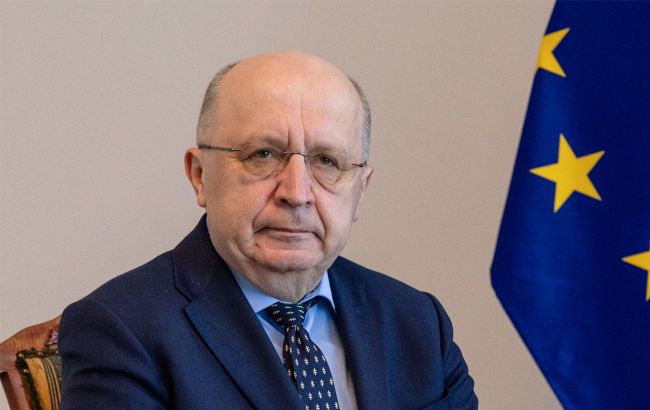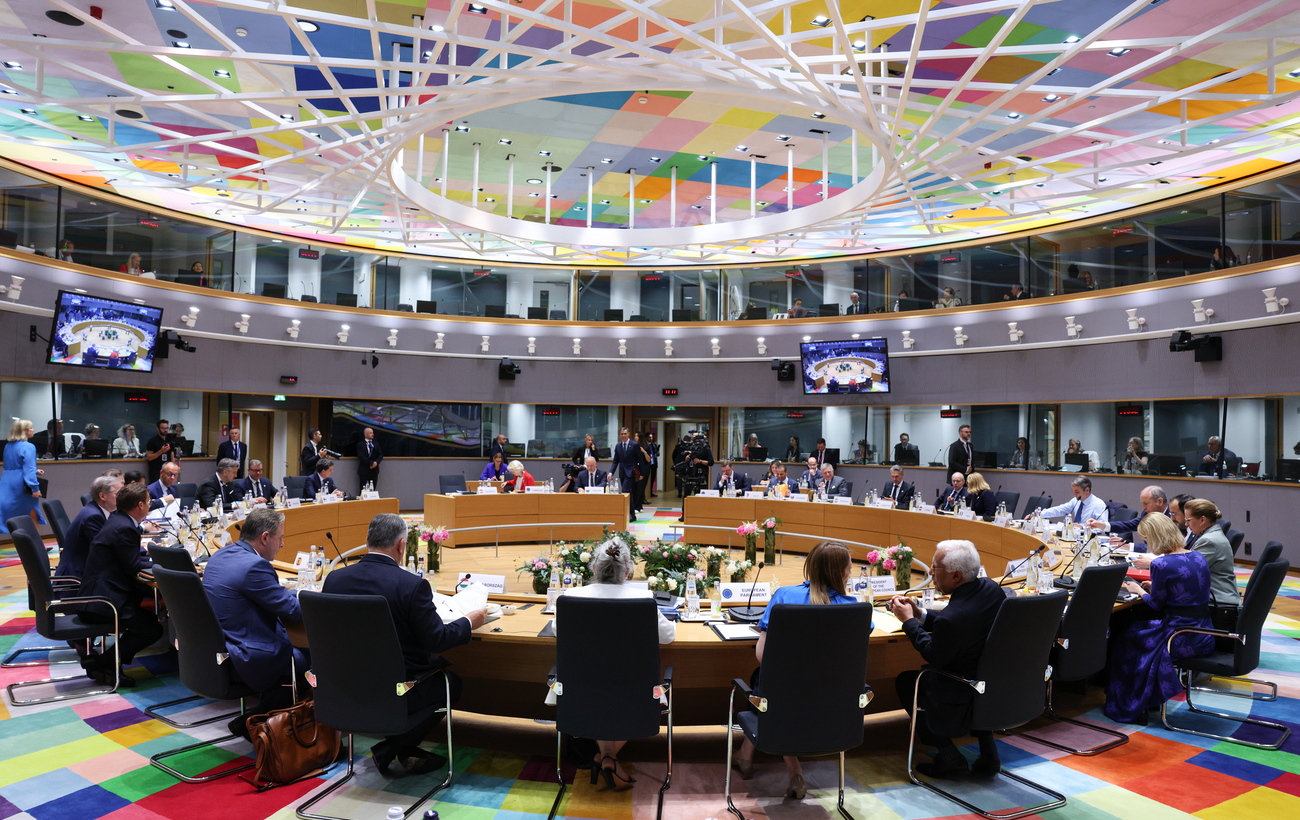EU Commissioner Andrius Kubilius: 'Only strong defense capabilities can deter Putin's plans to attack'
 Photo: Andrius Kubilius, EU Commissioner for Defense and Space (Getty Images)
Photo: Andrius Kubilius, EU Commissioner for Defense and Space (Getty Images)
How Europe is preparing to counter potential Russian aggression, whether the EU can replace the US in supporting Ukraine militarily, and the prospects for a ceasefire — read in an interview with European Commissioner for Defense and Space, Andrius Kubilius, with RBC-Ukraine.
The rise of Donald Trump and his public remarks on global security sent shockwaves through Europe as early as the end of this winter. Europeans suddenly realized they could no longer unquestioningly rely on the United States, neither for their own security nor for the continuation of military aid to Ukraine.
Europe truly stirred to action, unveiling an €800 billion rearmament plan.
However, in typical EU fashion, the pace of change may appear too slow. Some countries — particularly those that don't feel an immediate Russian threat — have tried to avoid mandatory defense spending increases or sought to soften the requirements.
These issues were at the forefront of discussions this week at two major international gatherings — the NATO summit in The Hague and the European Union summit in Brussels (European Council). Ahead of the EU summit, RBC-Ukraine sat down with Andrius Kubilius, whose position as Commissioner for Defense and Space is a recent addition to the European Commission.
"Only strong defense capabilities can deter Putin's plans to attack us," the Commissioner emphasized. According to him, Europe has truly "woken up" and is steadily preparing to secure the continent on its own, without constantly looking over its shoulder at the US. And helping Ukraine repel Russian aggression is a key part of that effort.
Watch the full video interview or read the full transcript below.
— So, Commissioner, first question is how do you assess the risks of Russian aggression towards one or several EU nations? How is Europe preparing for that? Is the speed or the pace of these preparations enough for Europe to withstand that potential aggression in the very foreseeable future?
— Well, to assess threats, it's a job of intelligence services, not of politicians. And that is what I'm always paying very much attention to. In Europe, we are paying much attention to our intelligence services. And definitely when, for example, heads of intelligence services of Germany, Denmark, or other countries are saying that Putin can be ready during the next three or five years to test Article 5, we consider those warnings to be serious signals to us. We need to be very serious about the possibility of such a threat.
So this is one thing. We are really serious about such possibilities. Second, of course, this is for us a motivation to have a very clear perspective on what we need to do. So, till that possible time of Putin's aggression, we need to strengthen our own defense capabilities because only strong defense capabilities can deter Putin's plans to attack us. So that is what we are doing, and during the last several months, really, there has been a lot of progress here on the EU side with our decisions and their implementation.
On the financial side, we created a special program, ReArm Europe, with 800 billion euros, which will be spent by member states till 2030. Now with industrial capacities and industrial possibilities, we passed very quickly, very important decisions on how to remove any possible bureaucratic obstacles from defense industry possibilities to expand their production. We're also looking at how to strengthen our cooperation with Ukraine. That is one of the priorities. So a lot of things are really moving ahead.
— Is it fair to say that Europe has truly woken up, as it was said late February, early March, after the famous Munich conference?
— Well, Europe has, I would say yes, woken up. First of all, definitely, Putin was the reason why Europe woke up back in 2022. A lot of things have been done since then. Time with sanctions, policy, and so on. Now, after American elections and after American inspiration in different forms, sometimes not very diplomatic, but it explained to us that the defense of Europe is mainly the responsibility of Europe itself. They will keep the nuclear umbrella, the American nuclear umbrella for us, but everything else progressively should go into our responsibility.
That really was again a signal, which, if you look a little bit back, in retrospect, was really quite a strong shake to wake us up.
— So, how soon will Europe be able to achieve that strategic autonomy in the defense sphere, not to be dependent on the US? Maybe, but for the nuclear part, everything else, in conventional weaponry.
— Perhaps it will not be something like that, that suddenly one day we could be able to say "Oh, we achieved, and now we are...". Perhaps it will go in some kind of evolutionary way, so that we shall increase our capabilities.
It would be good to have a clear plan on our side on which capabilities we need to replace and to agree with Americans how long it will take, how much it will cost, and so on. So it will definitely take not one year. Some of the capabilities, perhaps, we need to be ready to replace more quickly. And that is for our military experts to say. But at least, very important would be for us to understand that that's going to happen. Well, maybe in 10 years, Americans will diminish their role.
This is one thing. Second, we need to keep in mind that Russia is staying very aggressive and even becoming more and more aggressive. And the question we need to ask ourselves, how we can bring all the most important resources on the normal democratic European side, in order for us to be ready to defend all of the normal Europe. And that is where a question comes about the possibility of Ukraine to integrate as quickly as it will be possible, integrate into some kind of new European structures which we shall need to develop to balance this institutional level of our defense readiness when Americans start to move out.

European Council meeting on June 26 (photo: consilium.europa.eu)
— How do you, as a commissioner, persuade the individual member states, as we've seen before the NATO Summit, some of them really tried to dodge this requirement of 5%.
— Well, you know, persuasion is the only possibility. Other instruments are not available. So and of course, again, this is a job for NATO, but absolutely clear that we need to take care about how such kind of decisions can make an impact on our own development. So that's what is really important for us. And we are doing what we need to do.
— In short-term and middle-term perspective, will Europe be able to replace the United States should they stop their help in this or that form?
— First of all, Americans are saying that they will not stop so abruptly. So that is one thing, and that's why I'm always saying that we need instead of complaining that Americans are betraying us and so on to develop a very clear plan, how much we need to invest into capabilities which we are now getting from Americans, and to agree on that plan with Americans.
There is something like a ten-year plan, how we shall replace. Some things can be replaced more easily, and some things need to be developed. But to do that in a rational and practical way. Fewer emotions and clearer targeted actions. And I think that really we can do that.
— Your general assessment of the current state of things in the war. Do you see at least any chances or perspectives for at least a ceasefire, not a full peace deal, in the coming months or this year?
— Well, I agree with that formula, which was supported at the very beginning by the United States, by Europeans, and by Ukrainians, that peace should come through implementation of the formula "peace through strength". And strength on the Ukrainian side. Till now, things have gone a little bit in a different way. The American administration was attempting to push the Russian side to real negotiations. But I think that it will not happen so easily as somebody may have expected. Because it's very clear that Putin does not want any peace for the time being. He considers that he is winning. And that is why peace, at the moment, is difficult for me to predict.

